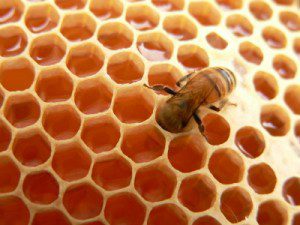By Mary West
Guest Writer for Wake Up World
The nightmarish consequences of tampering with nature through GMOs continue to unfold, as one of the worst fears associated with them are being seen – honeybees are dying off at an alarming rate around the globe. While some adverse effects of GMOs manifest quickly, the reduction in the bee population is one of the more insidious ones, manifesting somewhat more slowly. This problem is particularly disturbing because it puts a significant part of the world’s food supply in jeopardy.
Entire colonies of bees are disappearing, and farmers suspect the deaths stem from exposure to pollen from GMOs, which contain pesticides that weaken their immune system. This occurrence is called Colony Collapse Disorder and is responsible for the deaths of one-third of the U.S. bee population so far.
Dwindling numbers of bees are also seen in Europe, with several nations within the continent banning NON810, a brand of Monsanto maize. Their concern is also that the pollen of this crop is harming the insects.
[For more information check out Blamed for Bee Collapse, Monsanto Buys Leading Bee Research Firm]
India’s Crops Show Harmful Effects of Decline in Bee Population
India is another spot in the world suffering the effects of a reduced bee populace. The success of cotton crops here tells only part of the story because it is mainly self-pollinating and does not depend on pollination from bees. Other crops in the country portray the rest of the story.
The onion crop is showing the destructive effects of the sharp drop in bee numbers. A recent onion shortage is related to the shortage of onion plant seeds, the formation of which is dependent on bee pollination. It should be noted that the recurring shortage of onions began in the late 1990s after India started using GM seeds.
An apple crop shortage is also apparent, evidenced by poor harvests in some parts of Jannu, Kashmir and Himachal Pradesh. Unfortunately, the cause has mistakenly been attributed to other factors. Although cold weather has been blamed for the scanty yield in Kashmir and Jammu, the low temperatures are not new in these regions. In recent years, the bee population has plummeted in Himachal Pradesh, a phenomenon blamed on mites from Nepal. However, the magnitude of the bee decline indicates the likely cause is that a weakened immune system has made the bees vulnerable to mites. Although cold weather, mites and disease have been considered the culprits, the real problem may lie in India’s embrace of GM crops.
The Deadly Connection
Dr. Michael Wald, author of the soon-to-be-released Frankenfoods – Controversy, Lies and Health Risks, says that the connection between Colony Collapse Disorder and GMO ‘foods’ cannot be ignored.
“I believe that there is a link between the declining population of honeybees and the introduction into the environment of GM foods, particularly with Bt-corn. Because of its genetic modification, this corn produces a pesticide that can be toxic to many varieties of insects, including honeybees”, he explains.
Will Honeybees Become Extinct?
Extinction is entirely possible, Wald believes.
“The impact on the planet would be quite devastating given the essential role that bees play in the ecosystem. Their impact upon other wildlife and the interrelated planetary impact could create global environmental, food and economic issues”, he says
What Would the World be Like Without Honeybees?
Neil Carman Ph.D., scientific advisor to Sierra Club, says that because of the important role honeybees play in crop pollination, the demise of these insects puts crops that comprise one-third of the American diet in jeopardy. This includes nearly 100 fruits and vegetables.
In addition, bees give us honey, a food revered by many for its healthful properties. Honeybees are also responsible for adorning the landscape with gorgeous wildflowers.
Evaggelos Vallianatos, a professor with 25 years of experience with the Environmental Protection Agency, reports on the global decline in the honeybee population for Huffington Post. He summarizes the problem by declaring a world without bees would involve less food and would be more toxic for all life, including humans.
Sources:
- http://www.healthyaeon.com/2013/11/big-pharma-clinical-drug-trials-killing.html#more
- http://www.rsc.org/chemistryworld/2013/10/supreme-court-ruling-clinical-trials-halt-india
- http://www.huffingtonpost.com/evaggelos-vallianatos/honeybees-on-the-verge-of_b_4326226.html
Previous articles by Mary West:
- Hugs: The Ultimate Mind-Body Medicine
- Big Pharma’s Clinical Drug Trials Are Killing Thousands Overseas
- The Link Between Antidepressants and Murder
- 4 New Reasons to Avoid Pesticides
- Toxic Gene Discovered in GM Crops Shows Approval Process Is Fatally Flawed
- 5 Newly Discovered Health Powers of Asparagus
- Coconut Oil Could Help Fight Tooth Decay
- 8 Ways to Maximize Telomere Length and Increase Life Expectancy
About the author:
Mary West is a natural health enthusiast, as she believes this area can profoundly enhance overall wellness. Ms. West is the author of Fight Cancer Through Powerful Natural Strategies, and the creator of alternativemedicinetruth.com, a natural healing website where she focuses on solutions to health problems that work without side effects.
This article was republished with permission from Live in the Now, one of the fastest growing natural health newsletters. Visit LiveInTheNow.com to browse their complete library of articles, or join the nearly 60,000 readers subscribed to their Newsletter.

If you've ever found value in our articles, we'd greatly appreciate your support by purchasing Mindful Meditation Techniques for Kids - A Practical Guide for Adults to Empower Kids with the Gift of Inner Peace and Resilience for Life.
In the spirit of mindfulness, we encourage you to choose the paperback version. Delve into its pages away from screen glare and notifications, allowing yourself to fully immerse in the transformative practices within. The physical book enriches the learning process and serves as a tangible commitment to mindfulness, easily shared among family and friends.
Over the past few years, Wake Up World has faced significant online censorship, impacting our financial ability to stay online. Instead of soliciting donations, we're exploring win-win solutions with our readers to remain financially viable. Moving into book publishing, we hope to secure ongoing funds to continue our mission. With over 8,500 articles published in the past 13 years, we are committed to keeping our content free and accessible to everyone, without resorting to a paywall.







